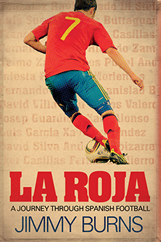Catalonia: Seny must prevail in Madrid before the rauxa dominates Barcelona
My Catalan neighbour and friend Joan could not contain his euphoria last night. He had spent part of his day helping form the human chain that had linked arms from the French Pyrennean border to the southern point of the Mediterranean coast that marks the end of autonomous region of Spain, Catalunya. “We are on our way to independence”, he proclaimed.
I am, to remind you, born in Madrid to a Scots father and a Spanish mother. I have, by choice, a home in Catalonia I and my family hugely enjoy. It is a part of Spain I enjoy because of its culture and its people and its football -civilised and tolerant and creative- and its open frontiers to the rest of the Iberian Peninsula,and the rest of Europe. I do not belong to any Spanish political party. In the UK I vote Labour. I regard myself as a European without a national flag.
Joan is a businessman and an artist. While once he represented the seny (common sense) and the rauxa (exuberant creativity) in a archetypal personification of Catalan duality , of late his idiosyncratic moderation has taken on a sharper edge. As a businessman, Joan blames the incompetence not to mention the corruption of the Spanish state for the financial crisis he has been subjected to,while the artist in him has found common cause with a colourful increasingly outspoken movement that now dictates the dynamic of Catalan politics, having bolted from the control of Spain’s discredited main parties.
Yesterday provided an impressive photopportunity in the form a meticulously planned demonstration of political solidarity with independent flags and chants monopolising La Diada, Catalonia’s traditionally pluralistic national day. Cynics might dismiss this as a political stunt, mere choreography, lacking a democratic mandate, verging on xenophobia even.
Certainly there is no denying that Catalan politics have been in the process of increased radicalisation since Spain’s constitutional court declared illegal Catalonia’s new statute of autonomy. Friends in Madrid used to point out that just over thirty percent of Catalans actually voted for the Estatut when submitted earlier to a referendum in 2006 in a less than fifty per cent turn out. But history does not stand still. An apparent refusal by the PP government not only not to recognise former agreements struck with Catalan nationalists by the former socialist government but to do anything that might appease Catalonia’s historic sense of victimisation, not to mention its refusal to deal with its rotten apples, has gradually reduced Catalan moderate opinion and boosted majority support for a referendum on independence,during a period when the traditionally dominant Catalan party the CIU has seen its own credibility seriously undermined by its sad record of corruption and political incompetence.
The continuing reluctance of the Spanish government led by Marian Rajoy to negotiate the terms of such a referendum(in stark contrast to Cameron’s agreement with Alec Salmond) shows not only a lack of statesmanship but also a critical lack of political maturity.
It makes no democratic sense for Madrid to continue to deny Catalans the right to determine their own future. Far from obstructing the referendum,both the ruling PP and the main main opposition PSOE, along with less radical Catalan parties should see this as an opportunity to offer a coherent case as to why being part of Spain can and should be seen as in Catalonia’s best interests,just as my own Labour party and the ruling British conservatives are preparing to argue the case for autonomous regions within the United Kingdom in the no-vote campaign of the Scottish referendum.
What is not an option is to allow Catalonia to end up declaring independence unilaterally as a consequence of inaction and by default and the appalling bias of certain sectors of the Spanish and Catalan media. Catalans deserve better than that. So does Europe.


Dear Jimmy,
I’d like to notice you a few thoughts. First of all that in the thirties Falange were supplied with machine guns coming from UK (I suppose not the state), another is that mobilisation recalls me when the people packed trucks to fight in Aragon front during the civil war, common people, singing, going cheerfully to fight the fascism… There was 75 years from the Ebro battle, the human chain had another Ebro battle.
Luckily the Congress has blamed the attack to Catalan house in Madrid, so we are in a different time, we are in EU, there is no revolution in Catalonia, there is not putsch, some the bullets marks in the congress were removed, terry is history in football… Times are changing (except for Iker).
Catalonia has the moral, historic and economic right to think in a better future, Spain at less will have a complete sports facilities in Madrid ( 8.300 million pounds). El catala emprenyat is letting way to el madrilenyo cabreado, time to time and we will see Madrid asking for independence of Spain.
Dear Jimmy,
I agree completely!
Thank you for your views. Very interesting indeed.
Watching from afar, via the Catalan news channel http://www.3cat24.cat , the massive civic demonstration in Barcelona against the ruling by the Spanish Constitutional Court on the Catalan Estatut, I could not help but draw a parallel between the organisation of the rally and the current political situation.